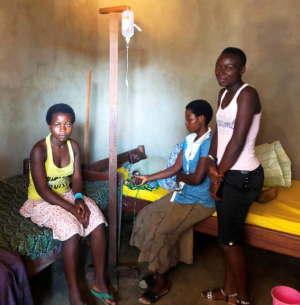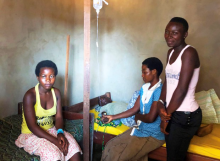Youth speaking to youth about dodging bullets and Ebola in Democratic Republic of the Congo
A phone rings. Masika Kyavaghendi Zoé reaches into her navy vest pocket now vibrating. She’s alerted there is a family refusing to take their brother to the Ebola Treatment Centre. She and two of her team members head over immediately to the Siloe private clinic in Kalinda town in northern Democratic Republic of the Congo, where a group of sisters is sitting at their brother’s bedside. He’s 13 years old and in a coma.
When staff at the local hospital told them he matched the case definition for Ebola, they declined to send him to the specialized treatment centre because of rumours that people go there to die.
While Zoé clears up the false information, her colleague Jimmy speaks to one of the sisters, who he knows from a local youth group.
“I know you’re thinking of studying medicine," he tells her. "You’re scientific. You understand that going to the treatment centre may be his only chance to survive."
After around an hour of discussions, the sisters agree. They arrange for the World Health Organization (WHO) team to call an ambulance for their brother to go to the Ebola Treatment Centre (where he will eventually leave, fully recovered).
“The big problem here is the violence has been going on for years,” explains Zoé, 25, referring to the armed conflict in the northern province of North Kivu, where she grew up. “There’s mistrust. There’s unemployment. The youth are vulnerable.”
She says one of the most important discussions to be having among local youth right now is that taking up violence will only destabilize society further and make unemployment worse.
"I tell the youth: 'We’ll escape the bullets but end up dying anyway if we don’t take action against Ebola.’ Then they get it and they agree to protect themselves and the community,” she says.
A virus as deadly as bullets
Talking about the risk of Ebola, though, has become dangerous for the WHO young risk communications team that Zoé is part of. She has been threatened more than once for explaining the risk of Ebola.
Isn’t she afraid?
"The spread of the virus is just as much of a risk," she points out. "The best way to make a difference is to stay and keep working. Then we always find a way.”
Zoé and the WHO team of young risk communicators have been working as part of the response to the Ebola outbreak in North Kivu. In addition to her work for the Ebola response, she is head of the Youth Club for the Development of Butanuka, president of the Beni Communal Youth Council and in charge of the childhood protection programme at One Girl One Leader.
She has been leading youth discussion groups for years. Since the Ebola outbreak began more than six months ago, she and her young colleagues have been working morning to night, seven days a week.
Youth engagement impacts Ebola case numbers
Zoé and Jimmy are among more than 40 focal points working in North Kivu with young leaders in pressure groups, religious associations and societies to empower young people.
Working with youth groups has been a priority since early in the response because of its direct impact on the Ebola “epicurve”.
"For example, when we started work with pressure groups in Butembo, we immediately saw a decrease in cases. However, as the socio-political and security landscape evolves, we need to continue to adapt our community engagement strategy in order to keep the curve going down and end the outbreak," says Julienne Anoko, WHO anthropologist.
Community engagement is a critical pillar of the Ebola response. To drive cases down to zero, every community needs to be actively involved in the response against the disease. WHO and partners are working with more than 4 000 risk communicators, community leaders, anthropologists and others in the North Kivu Ebola outbreak, including contact tracers who go door to door doing active and passive case searching and speaking with the community.
Emergency Communications Officer
Tel : +243 81 715 1697
Office : +47 241 39 027
Email: kabambie [at] who.int
Cyclone Idai Communications Consultant
WhatsApp: +34 684 351 674
Tel: +243 844 957 683




